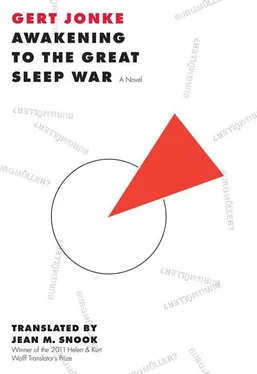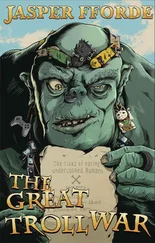Gert Jonke - Awakening to the Great Sleep War
Здесь есть возможность читать онлайн «Gert Jonke - Awakening to the Great Sleep War» весь текст электронной книги совершенно бесплатно (целиком полную версию без сокращений). В некоторых случаях можно слушать аудио, скачать через торрент в формате fb2 и присутствует краткое содержание. Год выпуска: 2012, Издательство: Dalkey Archive Press, Жанр: Современная проза, на английском языке. Описание произведения, (предисловие) а так же отзывы посетителей доступны на портале библиотеки ЛибКат.
- Название:Awakening to the Great Sleep War
- Автор:
- Издательство:Dalkey Archive Press
- Жанр:
- Год:2012
- ISBN:нет данных
- Рейтинг книги:4 / 5. Голосов: 1
-
Избранное:Добавить в избранное
- Отзывы:
-
Ваша оценка:
- 80
- 1
- 2
- 3
- 4
- 5
Awakening to the Great Sleep War: краткое содержание, описание и аннотация
Предлагаем к чтению аннотацию, описание, краткое содержание или предисловие (зависит от того, что написал сам автор книги «Awakening to the Great Sleep War»). Если вы не нашли необходимую информацию о книге — напишите в комментариях, мы постараемся отыскать её.
, is an expedition through a world in constant nervous motion, where reality is rapidly fraying — flags refuse to stick to their poles, lids sidle off of their pots, tram tracks shake their stops away like fleas, and books abandon libraries in droves. Our cicerone on this journey through the possible (and impossible) is an “acoustical decorator” by the name of Burgmüller — a poetical gentleman, the lover of three women, able to communicate with birds, and at least as philosophically minded as his author: “Everything has suddenly become so transparent that one can’t see through anything anymore.” This enormously comic — and equally melancholic — tale is perhaps Jonke’s masterwork.
Awakening to the Great Sleep War — читать онлайн бесплатно полную книгу (весь текст) целиком
Ниже представлен текст книги, разбитый по страницам. Система сохранения места последней прочитанной страницы, позволяет с удобством читать онлайн бесплатно книгу «Awakening to the Great Sleep War», без необходимости каждый раз заново искать на чём Вы остановились. Поставьте закладку, и сможете в любой момент перейти на страницу, на которой закончили чтение.
Интервал:
Закладка:
A language whose idiom-caravans would yield to us before we took their nimble light-signal sentences into our mouths and swallowed them.
We need a new language that will simply not allow itself to be persuaded by us.
The manhole covers on the city streets started flapping up and down like big round book covers, sometimes it looked as if the streets, with a rumbling sound, were growing fluttering cast-iron wings; from the opened sewer shafts, though, the wind blew in and out like the tooting of foghorns, the narrow streets had become deep, polyphonically complaining corridors for wind-section concerts, whose sewer-shaft instrumental chorales were accompanied by the experienced percussionists of the manhole-cover valves, always hopping up right in time, and hopping back down again; often it sounded like the rusty ship’s funeral march of a drained harbor, from whose channels, dried up once and for all, the seawater had drawn back, as if chased away by the wind, and had wandered far away, across the entire country, streaming over it, in order to build up a new coast for itself beyond this region’s tentacles, where it would be out of reach, out of contact. One after another, the traffic lights went out of order; to start with, entirely without system or plan, they blinked gloating greetings at many citizens for almost the entire day, after which they shut down, tired, exhausted by the exertion of law-breaking, of breaching the rules with their crazy refractory destructive games and jokes, yes, they suddenly shut the hinged eyelids of their eyes, almost all at once, in rapid succession, and slumbered calmly on, very audibly snoring, undisturbed by the ominous roar of the inevitable traffic chaos they’d naturally caused, complete with all its anarchistic inconveniences. In the twilight they sank into a really deep sleep. They crouched on the desolate, deserted intersections of the streets like large steel flowers that had closed their calyxes in the darkness, yes, their wilted, limp figures had solidified as they bent over in relaxation, shaped like blossom lamps, and were so deeply lost in thought that they could not be bent straight by anyone other than by themselves, when they would awaken in the morning.
Then her story went on to tell about that large room that he simply could not understand, that she had already mentioned back at the beginning, and that she described as a room almost without horizons, and tremendous country rains beat down on its transparent ceiling; or did that noise come from the countless typewriters in the aisle of the room, set up beside each other on little table-like stands, at which all the other people back then were sitting, catching up on their work?
One day, as she remembered, they had both turned up there, from the class she had mentioned previously, where they had already been together, according to her report, either the classroom had suddenly greatly expanded, had inflated into the area of the large room she had described, or many classrooms joined together had been transferred into the depths of this biosphere that was entirely new to both of them at that time; they had both turned up, as she indicated in her story, among all the other people there, who were silent, unapproachable, everyone most incomprehensible to everyone else, because they all sat separately by themselves, beside each other, behind each other, crouching alone at their typewriters, and all the typewriters together made a rushing sound like surf through the room, some also sat at drawing tables, all individually as if asleep, absorbed in the portrayal of so-called life, as if they had drowned, had sunk to the bottom of the flooded ocean of the room, as if the details they were working out were not being moved from head to paper, but rather the reverse, the descriptions that surfaced at the horizon of their captivated eyes were led from the paper through their fingers into their hands and upward through their shoulders into their heads, where in their minds everything may have wound up represented in vivid pictures, as if their intensive lives only streamed into them from their depictions, yes, as if from pictures breaking out of a canvas to guide the paintbrush or pencil of the painter or graphic artist seated in front of it, leading him forward, pulling him into the picture.
Their eyes were bound too, for a long time it seemed as if their heads had pupated; silently preoccupied with the depiction of that former time, they had one day been the first and were probably still the only ones who had secretly started talking to each other there — it had in any case taken a long time until, sitting beside each other, without having known it, they had finally rediscovered each other.
At first they had just started casting glances at each other, as back in school, in class, then there were times when they had looked at each other constantly, then written to each other, described each other, taken notes about each other, then soon not even that anymore, until they had finally waved at each other, even traded whispered words, slipped each other little secrets, without making a note of them, until almost all they did was talk, openly, undisturbed, enthralled by the great secrets shared between them.
Naturally they had asked each other what their names were, but even at that time they had long since been forgotten, and it was increasingly clear to them that they would have found any new names unutterable, unnamable.
Names at that time were the secrets by which people attempted to transform one another, so for the time being — a time in which, again and again, they meant something new to each other — they had mutually given each other changing names, and finally, from their namelessly monotonous and unutterable feelings of fabrication, they had become capable of inventing feelings that affected them deeply.
No, we didn’t belong with all the other people, those shade plants growing around us, tortured by the pain of light, tearing up every convenient bit of night from their typewriters, scattering it onto the fog walls of our (we thought, impossible) sleep — or did we sleep after all, back then?
Of course we did, even if just a little, at the beginning actually hardly at all, but presumably the others hardly ever slept (or else all the time, if one chose to doubt that they were in fact ever awake), as if they had to support the whole world that surrounded them with their uninterrupted sleeplessness, and weren’t we terribly afraid that after they woke up, or before they fell asleep again, that world would certainly collapse or cave in?
Perhaps we would have had to start with everything much earlier, we often thought, and began to hate our initial hesitant cowardice; or was it just that the names originally dedicated to us had still not been entirely forgotten?
Who knows if those self-designations wouldn’t have become a bitter disappointment; not limited to them, it was good that we were still waiting for new words meant only for us, but for how long, until when? Because we knew for certain that we could have no future there, not even a tiny future, in that world completely turned upside down, indeed supported on the heads of all those other people, yes, which got ever more threateningly narrow because it was fading away in their skulls, as if it had been pushed into cages, placed behind bars, as if it were locked into head cages; what’s more, the pupations of their heads seemed to be subject to certain tides, corresponding to organically driven clockwork, in accordance with which the head-encasing pupae, which seemed completely self-contained, sank from their rows of seats, dove down and then came tumbling back up again, and every once in a while, swaying, banged into each other; sometimes we wished those completely matured skull-enclosing pupae would finally hatch out in order to release, to set free their visibly matured world-feelings, naturally not without previously having the heads break open, as was inevitable, yes, if one of those heads, hatching out, began to burst every second, then gradually, out of every one of the pupae resting on the thousands of tired shoulders, one big, fully formed butterfly would flutter out, bearing new colors entirely suited to the hatching personality, swaying through the large room, fluttering, each with a different inner worldview depicted on its wings, and then, in that incredibly expanded room-hall-vault, the air over the typewriters would soon be interwoven and traversed by an immense swarm of worldview butterflies surging, hovering through all the heights and depths of the room, an oscillating multi-colored fluttering of shadows, yes, quite right, trembling opalescent shadow-leaf wing surfaces, for a short time also filling the room in the evenings, nights, when that wickerwork of worldview shadows would come to rest on the transparent ceiling-sky of the landscape-room, covering the surface, quite self-contained, yes, and then, colorfully decorated, shaded, an entirely newly developed nature would have broken out in that room, a nature that would have allowed the previously rigid walls to somehow fall back, tilting outward, and the sealed, locked region to break away, to fall off like colorful autumn leaves, yes, then the immense, locked-up room would suddenly roam through the region, would hover over the mountains, perhaps wander through the valleys along the rivers, along all the shores of the atmospheric oceans, and thus, with time, unexpectedly, a previously inconceivable, unimaginable, unforeseen, different natural world would have begun to grow and develop — but unfortunately, no, not a single head, hatching out, had started to flutter its thoughts to bits above it, although at least, insofar as our own feelings, there had certainly been a generally perceptible need to blow up those brain cages hanging in the air, yes, an unpleasant sultriness in the room had hovered down from the ceiling and wrapped itself around us, an irksome, complete change in the room-weather cloud canopy; however, only if the worldview-wing butterfly people had indeed broken out back then, out of that splendor of perfection, which would in no time have turned the entire room into a pupa, would something like a proper world-beginning have been able to take place in that steppe-room-area, right at the last minute; but in any case, it couldn’t have gone on any longer as it had been, or would it after all have continued — should we have kept on like that for even longer, back then? — or no? — it seemed we had no option but to disappear from there as quickly as possible — or else? — but how? — that was the question, because every plan, however carefully hatched, turned out again and again to be both particularly clever as well as exceptionally stupid, barely distinguishable, and then the question of when, because every point in time seemed equally auspicious as well as abnormally inappropriate to host that seemingly distant point a long way ahead of us in our life at that time, from which we then one day resolutely began to break out, completely aimlessly, without exactly having noticed when it had started. .
Читать дальшеИнтервал:
Закладка:
Похожие книги на «Awakening to the Great Sleep War»
Представляем Вашему вниманию похожие книги на «Awakening to the Great Sleep War» списком для выбора. Мы отобрали схожую по названию и смыслу литературу в надежде предоставить читателям больше вариантов отыскать новые, интересные, ещё непрочитанные произведения.
Обсуждение, отзывы о книге «Awakening to the Great Sleep War» и просто собственные мнения читателей. Оставьте ваши комментарии, напишите, что Вы думаете о произведении, его смысле или главных героях. Укажите что конкретно понравилось, а что нет, и почему Вы так считаете.











